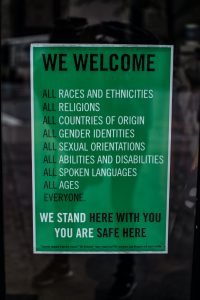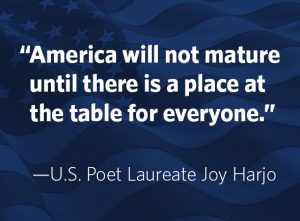In responding to the guilty verdict of Derek Chauvin, Vice President Kamala Harris sagely noted, “We are all part of the George Floyd legacy, and our job now is to honor it and to honor him.” I want to share with our college community the way in which CCBC will do its part to respond to the Vice President’s challenge to honor the life, death and memory of George Floyd.
The resolution of the Chauvin trial is an important milestone in the grueling slog towards social justice, a small, long-awaited step towards righting wrongs of our troubled nation. But, the need to do more continues. Last summer’s actions were fueled by the senseless violence against George Floyd, Breonna Taylor and Ahmaud Arbery. Ten months later other names have been added to the roster: Xiaojie Tan, Daoyou Feng, Julie Park, Hyun Jung Grant, Yong A. Yue, Suncha Kim, and Delaina Yaun, all recent victims of senseless violence. The list of names of the victims of violence against Americans – Black, Asian, Muslim, Hispanic, Caucasian – keeps getting longer.
While we share words of solace and encouragement with those who suffer, in the aftermath of George Floyd’s brutal murder, we made an institutional commitment that went well beyond words to express  our outrage. Words are ephemeral, quickly forgotten; it is action that can influence change for generations. At CCBC, we choose action. On June 5, 2020 I shared a message with the college community, A Time for Reflection; A Time for Action, which laid down a clear direction for concrete, impactful engagement. We created the President’s Diversity, Equity, and Inclusion Advisory Council and committed to a series of bold ventures. They included facilitating uncomfortable conversations about hiring practices; responding to data that cried for academic reform to close retention and completion gaps; mobilizing our vast workforce training capacity to increase skills training and career opportunities for underrepresented minorities; and in general, fostering a climate of equity, civility and inclusion for our diverse community of faculty, staff and students.
our outrage. Words are ephemeral, quickly forgotten; it is action that can influence change for generations. At CCBC, we choose action. On June 5, 2020 I shared a message with the college community, A Time for Reflection; A Time for Action, which laid down a clear direction for concrete, impactful engagement. We created the President’s Diversity, Equity, and Inclusion Advisory Council and committed to a series of bold ventures. They included facilitating uncomfortable conversations about hiring practices; responding to data that cried for academic reform to close retention and completion gaps; mobilizing our vast workforce training capacity to increase skills training and career opportunities for underrepresented minorities; and in general, fostering a climate of equity, civility and inclusion for our diverse community of faculty, staff and students.
Lead by co-chairs Jadi Omowale and Yvette Bunn Jones, our colleagues on the President’s Diversity, Equity, and Advisory Council are taking aggressive steps to turn the promise of those June 5th commitments into tangible results. In less than a year’s time, we have reenergized the Male Student Success Initiative; kept our doors open amid a pandemic for students who need us; developed a Tuition Free initiative that enabled 81% of our students to attend CCBC with full or part-time scholarship support; revamped a longstanding “cancellation for non-payment” process that automatically “cancelled” the registration of those unable to pay their tuition; and began to develop a Diversity Climate Survey for CCBC. All of this good work has been fueled by our college’s broad definition of diversity: race, ethnicity, gender, age, mental and physical ability, religion, socio-economic status, sexual orientation, gender identity, national origin and opinion. Each of us relates to one or several of these categories. And, each of us has a right to be treated with dignity and respect, as validation of our self-worth.
At the recent Creative Writing Forum, United States Poet Laureate and Native American Joy Harjo  framed a simple metaphor to capture the essence of the work we are doing: “America will not mature until there is a place at the table for everyone,” she said. “We are all working on the same big story.” Harjo’s simple metaphor frames a compelling goal for CCBC. We are now a minority majority institution. We must ensure that every student, faculty and staff member has a seat at our communal table. You have only to look across our college–into our classrooms, Advising Centers or tutoring and library cubicles–to realize that diversity lies at the core of our mission. We are first and foremost an educational institution, but we also serve as a bastion of calmness, serenity, safety and opportunity for all who enter our doors. I say emphatically there is no place for racism, inequality, or marginalization of any group or individual at CCBC.
framed a simple metaphor to capture the essence of the work we are doing: “America will not mature until there is a place at the table for everyone,” she said. “We are all working on the same big story.” Harjo’s simple metaphor frames a compelling goal for CCBC. We are now a minority majority institution. We must ensure that every student, faculty and staff member has a seat at our communal table. You have only to look across our college–into our classrooms, Advising Centers or tutoring and library cubicles–to realize that diversity lies at the core of our mission. We are first and foremost an educational institution, but we also serve as a bastion of calmness, serenity, safety and opportunity for all who enter our doors. I say emphatically there is no place for racism, inequality, or marginalization of any group or individual at CCBC.
Not here! Not now! Not ever!
